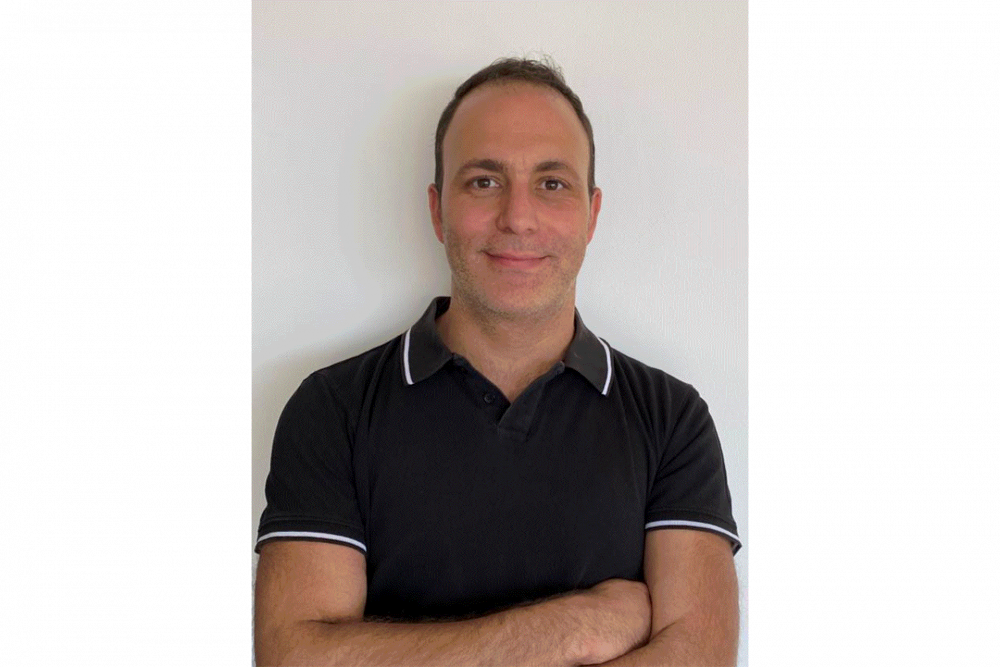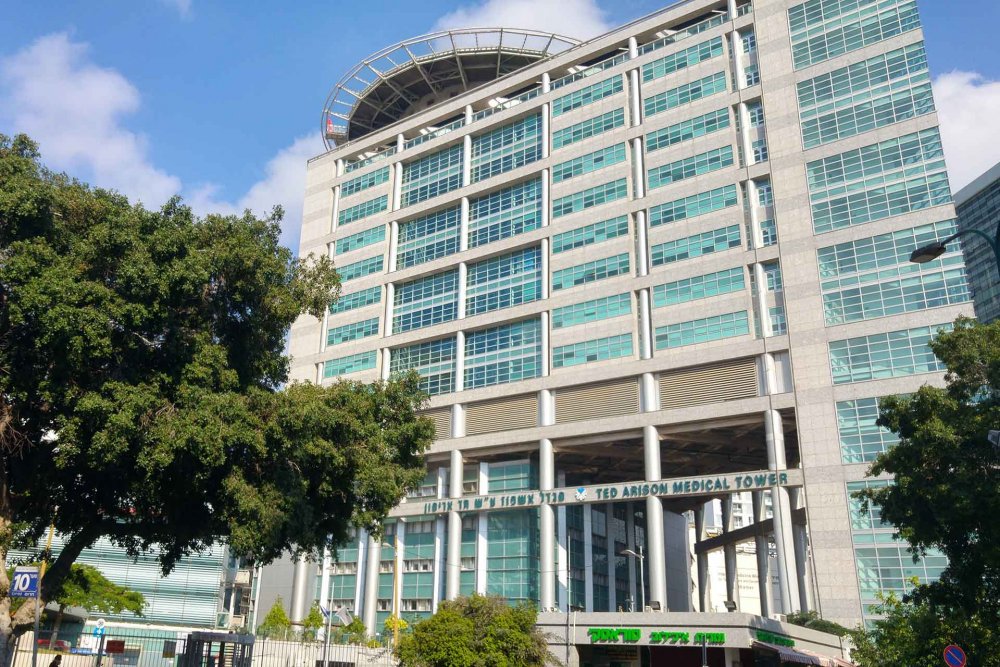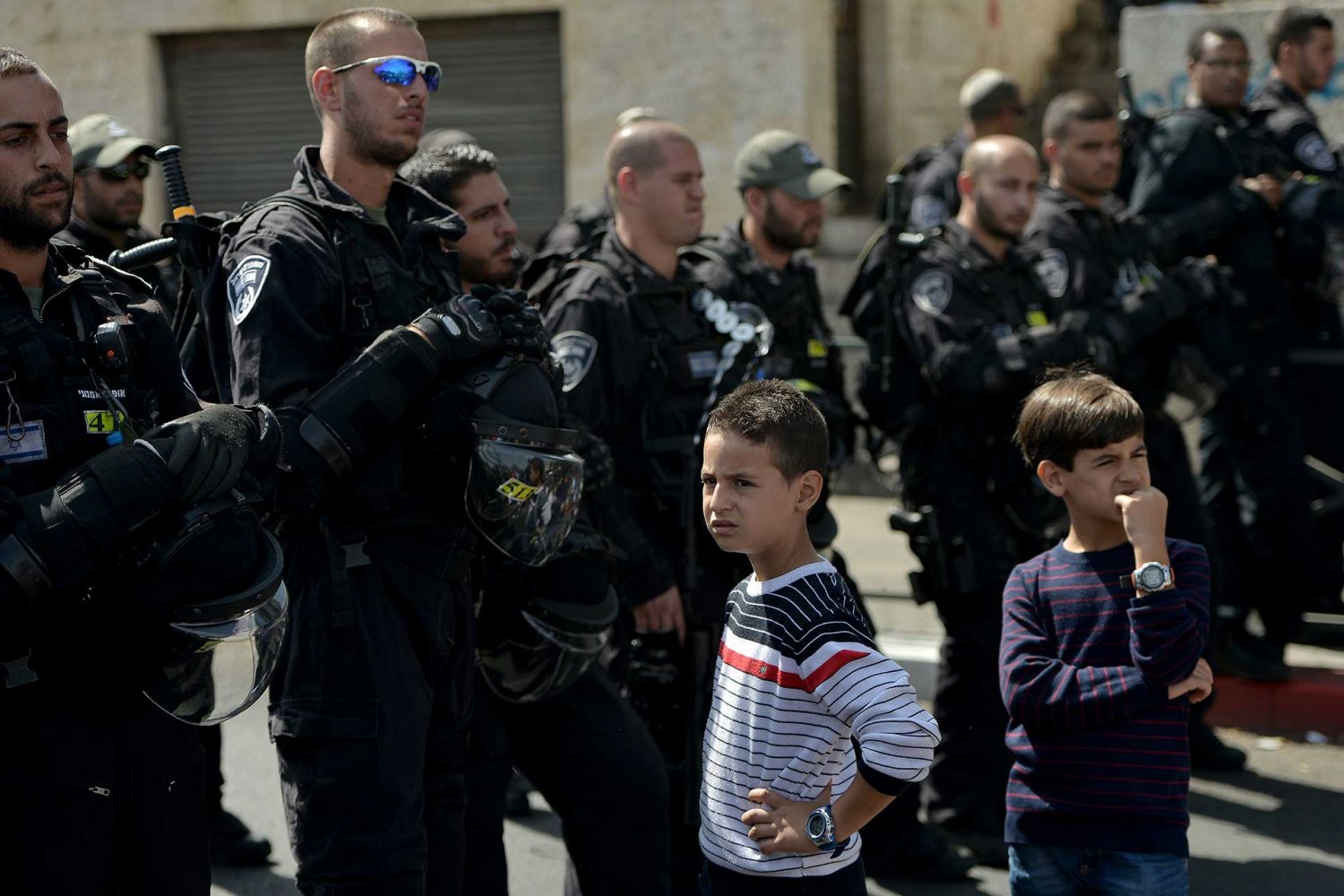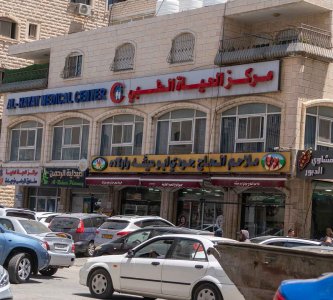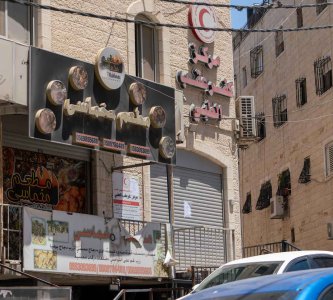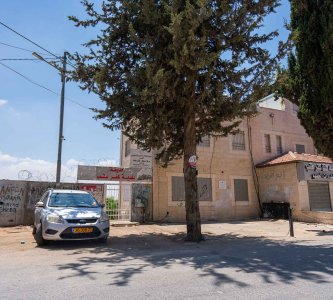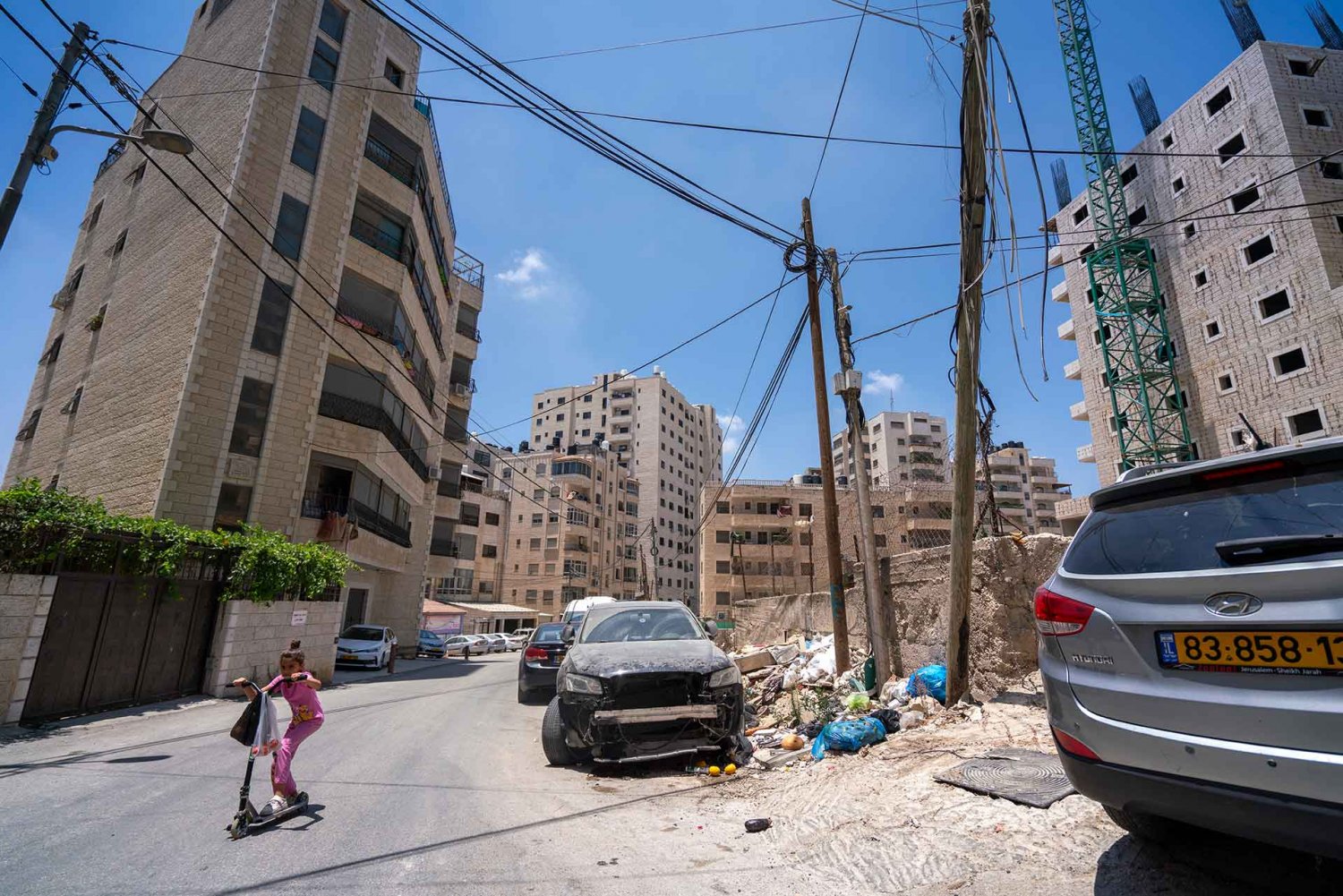Introduction
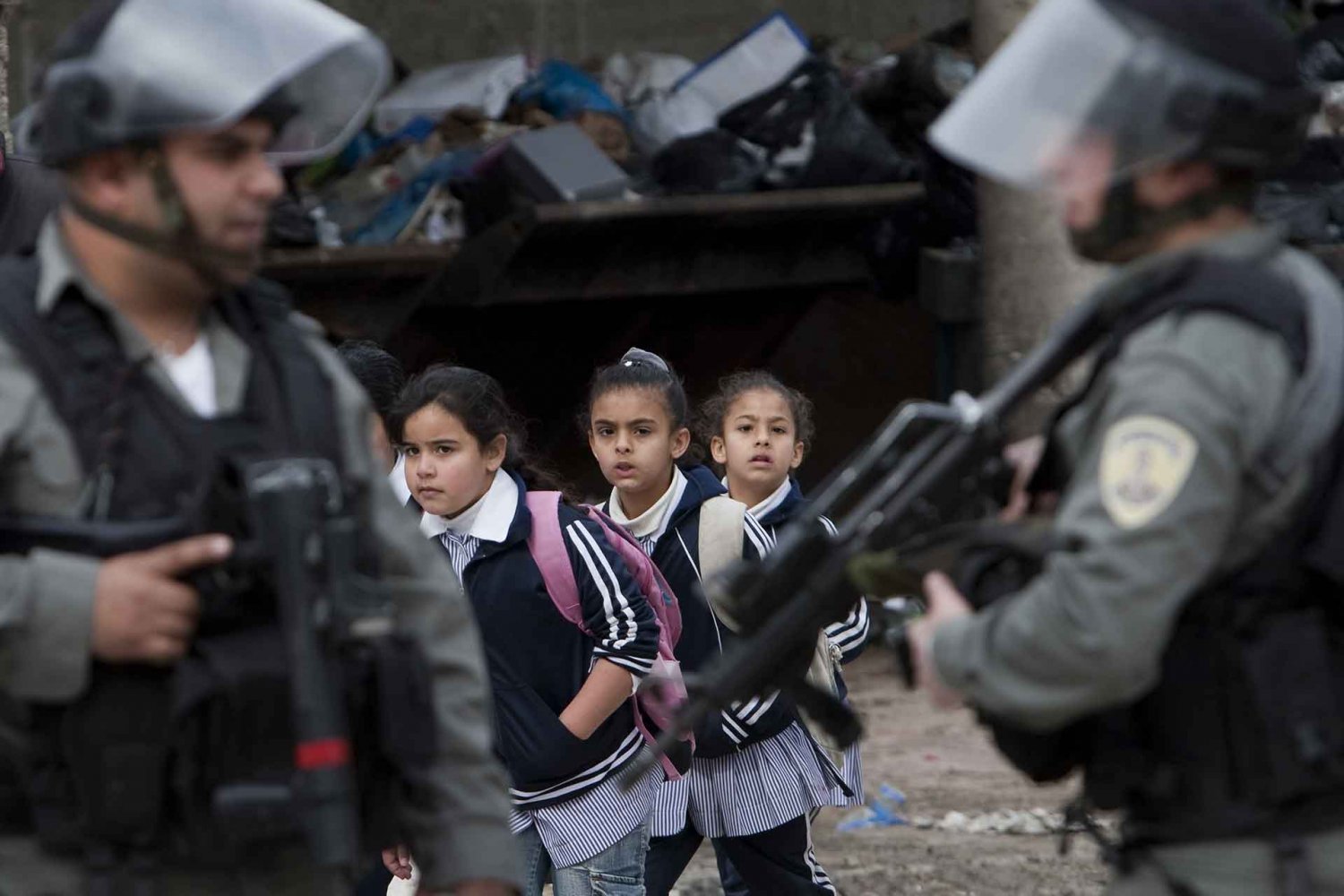
Credit:
Menahem Kahana/AFP via Getty Images
Pediatrician Osama Tanous: How “Unchilding” Helps Us Understand the Health of Palestinian Children in Jerusalem
Osama Tanous is a pediatrician and public health scholar based in Haifa, Israel. He is the codirector of the Palestine Program for Health and Human Rights, which is a partnership program between Harvard University’s FXB Center for Health and Human Rights and the Institute of Community and Public Health at Birzeit University. The partnership includes several scholars and academics who utilize a decolonial framework in program development, leadership, and engagement. Osama is a board member of the US-based NGO Physicians for Human Rights Israel (PHRI) and has written many scholarly articles and magazine pieces about public health amongst Palestinians, especially children.
One of Osama’s most widely sourced journal articles is titled, “Beyond Statelessness: ‘Unchilding’ and the Health of Palestinian Children in Jerusalem.” The article, published in a special issue of Statelessness & Citizenship Review in 2022 and coauthored with Bram Wispelwey and Rania Muhareb, outlines how structural racism, prolonged occupation, and settler colonialism shape the social and political determinants of the health of Palestinian children in East Jerusalem.1 Osama’s other work focuses more broadly on public health within Palestinian society, such as the coronavirus response in Jerusalem, homelessness and home insecurity in relation to Palestine and the United States, and how hospitals in Israeli settlements are part of a wider effort to normalize settlements across the country. With his writing, Osama aims to shift the narrative in medical literature to address the root causes of health disparities across Palestine.
Jerusalem Story spoke with Osama on September 10, 2024, to discuss his work in Haifa and Jerusalem, the stress and trauma faced by Palestinian children in East Jerusalem, statelessness and the concept of “unchilding” (see What Is “Unchilding”? BOX, below), and the lack of proper data on health disparities.
Jerusalem Story (JS): Can you share a bit about your background and where you studied?
Osama Tanous (OT): I grew up in Tarshiha, a small town in the Galilee, an hour’s drive from Haifa, very close to the Lebanese border in the northern region. I lived there until I was 18. After graduating from high school, I moved to Tel Aviv, where I studied for my medical doctorate and master’s degree in public health at Tel Aviv University. I then did a fellowship in public health and health policies at Emory University’s Rollin School of Public Health in the US. Then I moved to Haifa to do my training, and I've been living in Haifa ever since.
JS: What inspired you to become a pediatrician?
OT: Just like other marginalized communities, Palestinians seek job security. We know we are in a very racist job market; we can’t really pursue our dreams and study whatever we want, like history or anthropology—we must be realistic and pragmatic. We need job security to make a living, so that’s why a lot of people go into medicine and other health professions, such as nursing or pharmacy, and so on. My father was a pediatrician and my mother’s a nurse, so I grew up in a family of health science professionals.
JS: Why did you start writing about public health in Palestine?
OT: From a young age, I experienced discrimination and land confiscation around my village in the Galilee. Through political education, I started to understand the Palestinian story and struggle. I had the opportunity to go to medical school in Tel Aviv, where I started making connections between health and the broader picture beyond the clinic. While I was working in hospitals in Tel Aviv, I would see patients from the West Bank or Gaza, and I thought it was great that kids who have cancer can get treated in a world-class, Western healthcare system. But then I realized it’s not out of humanity or love, because when they complete their treatment, they’re brought back to Gaza to be bombed again. So, I started searching for more tools and lenses to understand the reality that we live in.
These complex realities make sense when you put on the right lenses. When I was a student, I used to volunteer with the open clinic at Physicians for Human Rights, which helped me to understand the health of society through the lens of race, class, and colonialism, so my journey has been an attempt to make sense of things around me. I write in order not to get crazy; I feel I have a duty to document what is happening and portray it correctly.
JS: What public health issues are unique to Palestinians in Jerusalem?
OT: I’m part of a collective from the Palestine Program of Health and Human Rights that is based at Harvard and Birzeit universities, and we write a lot together.
The article “Beyond Statelessness” was a way to resist the fragmentation of the Palestinian people—Palestinian citizens of Israel, those in East Jerusalem, in the rest of the West Bank and in Gaza, and refugees—without reduction. They don’t all have the same story; they have very different realties, but all of them are subjected to Israeli violence, settler colonization, and apartheid, and it shapes their lives in different ways. I wanted to tackle the issue of statelessness in Jerusalem, because Palestinians in Jerusalem are not citizens, they’re residents. They aren’t part of the Israeli state, and they’re prevented from being part of Palestinian statehood, so it’s a very complex reality. They are subjected to the violence of the state in many ways but without protection in terms of welfare and healthcare.
We wanted to explore how Israel gave residency and health care to Palestinian residents in Jerusalem. That didn’t make sense to us: Why did Israel extend health care services to Palestinians in Jerusalem but not a few miles away to Bethlehem or Ramallah, and why do something like that if they want to get rid of this population? It’s not out of love or care, it’s part of wanting to annex Jerusalem. These people pay taxes, they are given health care, but at the same time, Israel continues to brutalize them: demolished houses, policing, neglecting every aspect of life, education, and housing, but supposedly granting them health care services. So, we tried to explore what it means to be stateless in Jerusalem, specifically the issue of children, and what it means to be a Palestinian child, where the state looks at you as a danger, wants to keep you a minority, and treat you like a security threat, but at the same time provide health care and education.
We felt that the only way to make sense of this is to understand Jerusalem as an open frontier, because in a settler-colonial framework, the imagination of the frontier is the place that is constantly inflamed. Jerusalem is the capital, and there is an attempt to keep it an open and inflammatory frontier where violence is celebrated, where it’s an ongoing struggle, and the city itself is an open frontier, with more land being annexed, more settlements, trying to expel Palestinians, revoke their citizenship [and residency], demolish their houses, make life more and more unlivable—because it creates duality. The cowboy and the Indian; the savage and the civilized.
JS: How does the concept of “unchilding” help us understand the lived reality of Palestinians in Jerusalem?
OT: “Unchilding” is one of the only ways to understand the ongoing killing of, attacks against, and incarceration of children in Jerusalem, which is sometimes even more violent than attacks on children in the [rest of the] West Bank, because you have this constant clash between the settlers, the soldiers, and the “natives.” The whole area is so militarized.
What Is “Unchilding”?
As explained by Tanous et al. in their article “Beyond Statelessness”:
“The concept of ‘unchilding’ was coined by Professor Nadera Shalhoub-Kevorkian in 2019, after decades of living in the Old City of Jerusalem and researching the effects of Israeli occupation and settler colonialism on the lives of Palestinian families and children.[1] Shalhoub-Kevorkian observes that in settler colonial contexts, Indigenous children are regarded as dangerous, racialised others. She shows how, in Palestine, Zionism dehumanises Palestinian children by designating them as ‘born-terrorist[s]’.[2] Shalhoub-Kevorkian’s notion of unchilding takes us beyond the deployment of victimhood, trauma and innocence in the analysis of Palestinian children’s experiences to begin to understand how, in a settler colonial context, children’s mere existence is criminalised, state violence against them is normalised and their suffering is legitimised. Their lives and bodies become ‘political capital’ and their homes and neighbourhoods become experimental playgrounds for militarised surveillance, the development of the weapons industry and acquisitive profit.[3] Palestinian children are not only excluded from the settler collective, but they are excluded from childhood and humanity itself, to become legitimate targets of settler state violence.[4] In the premature, forcible removal of children from childhood, unchilding represents at once an obvious yet incompletely described determinant of child health which, like direct killing or post-frontier assimilation, represents yet another eliminatory component of settler colonial logic and practice.”
—Excerpted from Osama Tanous, Bram Wispelwey, and Rania Muhareb, “Beyond Statelessness: ‘Unchilding’ and the Health of Palestinian Children in Jerusalem,” Statelessness & Citizenship Review 4, no. 1 (2022): 88–112.
[1] Nadera Shalhoub-Kevorkian, Incarcerated Childhood and the Politics of Unchilding (Cambridge: Cambridge University Press, 2019).
[2] Ibid., 1.
[3] Ibid., chs. 1 and 6.
[4] Ibid., 121.
A concept that arose from the realities of Jerusalem
Click to learn more
In the US and Canada, the idea was to kill the Indian and save the child. They would take indigenous children into Catholic schools to kill the Indian inside the child and make them white to integrate them.
In the Palestinian context, that is not possible. Palestinians cannot become Israelis. They can’t join that collective, so Palestinian children are “unchilded” to become a legitimate target. Palestinian children are seen as inherently dangerous—they will grow up to be terrorists or criminals. They stop being children whom you need to care for or who need investment in their education, welfare, and housing. Instead, they try to get rid of them in different ways by punishing them, either in prison or by killing them.
JS: How does this connect to the health care of Palestinians in Jerusalem?
OT: Palestinians in Jerusalem fall into a gap. They are excluded in Israeli statistics and Palestinian statistics. We wanted to focus on how problematic that is and offer tools for people who want to make sense of the disparities in health care between adults and children, Jews and Palestinians, and the [largely Palestinian] East and [almost wholly Jewish] West of the city.
People receive health care in Israel through four health care providers according to the 1994 national health insurance law. Every citizen and resident, including Palestinian Jerusalemites, must join one of these health care providers. We pay taxes and we should receive health care, and it should be affordable, equitable, high quality, and accessible. If you look at Tel Aviv or Haifa, you have access to a network of clinics and hospitals. In [East] Jerusalem, they’re completely unregulated, so they don’t have the same standards as they would in Tel Aviv or West Jerusalem. They outsource the health care services to different health care providers who don’t have the same standards, quality, or access. You have people in [East] Jerusalem who are residents, but the municipality built a wall (see The Separation Wall), so neighborhoods beyond the wall are completely abandoned. Yes, technically Israel does provide health care to Palestinians, but if you look at its quality, it is completely unregulated, outsourced, and held to different standards [than those for health care for Israeli citizens].
This is not talked about. When you dig into it and look at how the health care runs in [East] Jerusalem, you see a very different image. Palestinians are not the priority of the state; it’s not Israel’s vision to create a healthy Palestinian nation. It’s similar in education—what does it mean to annex East Jerusalem? You have these people who are residents, not citizens, they pay taxes, and who will they go to when they want services? They cannot go to the [rest of the] West Bank or Palestinian providers, so it’s a very organized form of abandonment and violence. The system is designed that way.
It’s a similar process for Palestinian citizens of Israel on a different timeline. These health care providers were built for Jewish Israelis, not us, but they had to accommodate us as a market, as patients, as employees. We managed to find different ways to integrate and survive, but that isn’t the case in Jerusalem. It’s much more violent and inflammatory, because it’s an ongoing frontier.
JS: What kind of impact would all this have on the long-term health of Palestinian Jerusalemites?
OT: People’s health is determined not by health care or the doctors we see, but by social determinants—the environment in which we live. If we look at how a Palestinian child grows up in East Jerusalem, from the moment the mother becomes pregnant, they are living through psychological warfare. Military everywhere, settler attacks, the bureaucratic hell of having to prove you’re a resident, the dread that your house might be demolished. Women have to give birth in specific hospitals in East Jerusalem so the child can get Jerusalem residency, which influences where they choose to deliver. And when the child is born, they have no safe neighborhoods to play in, no green parks, no form of security whatsoever, so that shapes every aspect of life from a very young age. You basically don’t know what security is; you don’t know what it is to not be afraid of the soldiers and the settlers. Violence is so pornographic in Jerusalem. There are flag marches and chants—it’s everywhere; it infiltrates all your senses. The city is highly militarized, you always need to be on watch; always anxious. So, what kind of future can you dream of? I think it’s something every Palestinian experiences, but in Jerusalem, it’s more visible.
We know that this has an impact on health. Stress causes faster biological aging. It causes more heart attacks and strokes. You see this in highly policed and ghettoized spaces, not just in Jerusalem, and this contributes to health disparities.
JS: Have you noticed any changes in patterns in public health in Jerusalem since Israel declared war on Gaza on October 7, 2023?
OT: It’s really hard to get proper data between Jews and Palestinians in East Jerusalem. The Israeli authorities don’t do proper studies of Palestinians alone, so very little data exist about the differences in life expectancy, child mortality, and so on. [Editor’s Note: Israel also bans the Palestinian Authority (PA) from doing any type of statistical surveys within the boundaries of municipal Jerusalem, i.e., Israel.]
JS: What are the biggest challenges of writing and researching these health care papers?
OT: It’s a challenge to get published. There is so much censorship around this issue: A lot of medical journals are gatekeepers and will say it’s too political, and they can’t publish it. There’s a huge amount of silencing on everything related to Palestine, especially in the medical sciences, so there’s also self-censorship.
JS: What are you working on at the moment?
OT: The focus is on Gaza, the war, attacks on health care, starvation, and different public health impacts of the war in Gaza. But it is a very uncomfortable atmosphere in which to write; there is a lot of intimidation and fear. I write because I feel it is a historical responsibility to document this; it must be analyzed and written, and I have the tools to do this through scholarship and education. Knowledge is power, and when it comes to health and medical literature, people flatten the story of Palestinians and their lived experiences. Some might write about the ill health of Palestinians in Jerusalem and behavioral patterns, or what they eat, or that they don’t do sports, or they smoke, but we ask: Why do they do this? We must look at the broader environment. Once we do that, we can understand that, of course, they will have more obesity, heart attacks, diabetes, and health issues than other groups. If people want to change and improve the health of Palestinians in Jerusalem, we can’t have workshops on stopping smoking and eating healthily. That will mean focusing on the problem as if it is unrelated to the state that has turned their neighborhoods and lives into a living hell. Nobody planned playgrounds or safe spaces to work out and exercise in and be safe outside, so we must locate the problem to find the solution and expose these very vicious politics that kill people.
I’m trying to shift the narrative in knowledge production in the hopes that we can create a critical mass of knowledge that will change how the topic is explored and addressed.
Notes
Osama Tanous, Bram Wispelwey, and Rania Muhareb, “Beyond Statelessness: ‘Unchilding’ and the Health of Palestinian Children in Jerusalem,” Statelessness & Citizenship Review 4, no. 1 (2022): 88–112.

